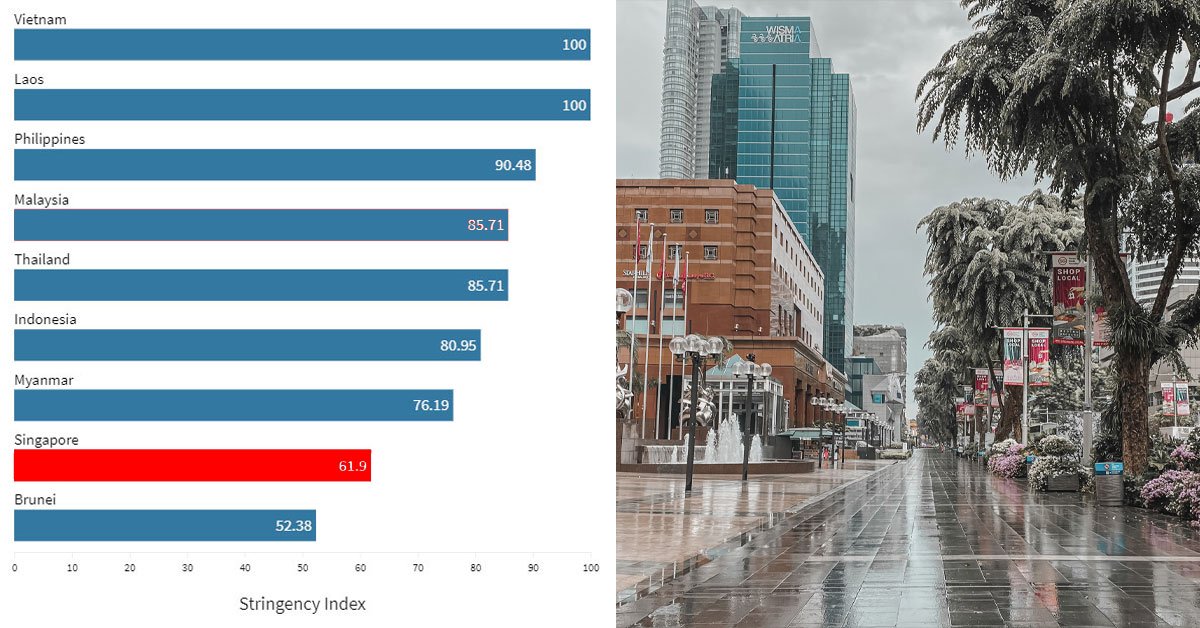How strict do you think are the measures the Singapore authorities have against Covid-19?
Top in the world since they condemned two-third of Singapore’s workforce into hibernation?
Or too lenient since our people can still go out despite the movement restriction order?
Well, if you’ve been wondering and pondering about this while you’re stuck at home, wonder no more.
Because a study by Oxford (yes, that really famous school where smart people go to) has ranked us in terms of the strictness of our measures.

Let’s just say that if you think we’re in a bad position, there are other people who are having it worse out there.
S’pore Ranked 8th in ASEAN
In a global study, Oxford COVID-19 Government Response Tracker conducted by the Blavatnik School of Government, Singapore is ranked 8th in ASEAN for the stringency of our response to Covid-19.

Reader Bao: Wait, I thought there are 10 countries in ASEAN?
Yes. The study collects data from publicly available information and the data for Cambodia is unavailable.

And that’s in ASEAN. If we were to rank Singapore globally in terms of stringency of our measures, we are ranked 108 in the entire world.
By the way, the total number of countries measured in this study is 122.
This Doesn’t Mean That S’pore’s Measures Are Lousy
You see our ranking, then you see the spike in the number of Covid-19 cases and you start getting mad.
Is this why our Covid-19 measures aren’t working? Is it because the government’s still too lax against the coronavirus? Or are they too scared because of the upcoming GE?!?!

The study itself says that just because a country is ranked lower doesn’t mean their response towards the pandemic isn’t “good”.
The COVID-19 Government Response Stringency Index simply records the number and strictness of government policies and should not be interpreted as measuring the appropriateness or effectiveness of a country’s response.
A higher position in the Stringency Index does not necessarily mean that a country’s response is ‘better’ than others lower on the index.
Here are the factors that the study is looking at when they ranked the countries:
- School Closure
- Workplace Closure
- Cancellation of Public Events
- Closing of Public Transport
- Public Information Campaigns
- Internal Movement Restrictions
- International Travel Controls
- Fiscal Measures
- Monetary Measures
- Emergency Investment in Healthcare
- Investment in Vaccines
- Testing Policy
- Contact Tracing
The study looks at the responses that a government make, and how quickly they make it, as the Covid-19 virus spreads within their countries.
And if you were to look at all the factors mentioned above, we’ve done all of them to varying degrees.
Here’s A Simple Analogy:
Imagine there are two students, A and B, who are taking the geography exam the next day.
One (A) has been studying consistently throughout the semester while the other student (B) left it all to the last minute.
If we were to look solely at how both students study on the last night, A only spent 30 minutes revising before going to bed while B slept at 4am trying to do some last-minute memorisation.
Does this mean that A is going to do badly compared to B?
The study on the stringency of governments’ responses is the same. It only looks at what governments are doing once Covid-19 broke out.
It doesn’t take into account that Singapore has been preparing our healthcare system ever since the SARS period back in 2003 (Emergency Investment in Healthcare).
It also didn’t take into account that since Singapore’s contact tracing was considered the gold standard, which means we are able to keep detect and contain the virus better, the closing of schools and workplaces only became necessary after a longer period of time.
Then How Come There’s A Spike in Covid-19 Cases?
If you’re stressed out over the past few days because the number of new Covid-19 cases in Singapore has been in the 3-digits, here’s something that might just soothe your worries.

While the number of cases is at an all-time high, the majority of these cases are work pass and dormitory-related cases.
In other words, they’re already isolated from the rest of the community.
Advertisements
As for community spread, it has been stable during the Circuit Breaker period. The number of community cases typically follows the pattern of imported cases: when it spikes, community cases will spike too.
For the third day in a row, there are zero new imported cases reported.
And the reason why there are so many cases is that the authorities are now testing work-pass and dormitory residents for Covid-19 aggressively.
Still, make sure to follow safe-distancing measures, yeah?
